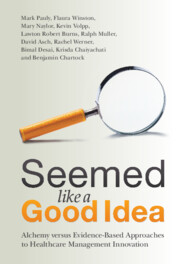 Seemed Like a Good Idea
Seemed Like a Good Idea Book contents
- Seemed Like a Good Idea
- Seemed Like a Good Idea
- Copyright page
- Contents
- Figures
- Contributors
- Preface
- 1 Baseline Observations
- 2 Evidence and Growth in Aggregate Spending and Changes in Health Outcomes
- 3 The Benchmark Decision Model, the Value of Evidence, and Alternative Decision Processes
- 4 Care Coordination
- 5 Evidence-Based Programs to Improve Transitional Care of Older Adults
- 6 Vertical Integration of Physicians and Hospitals
- 7 Evidence on Provider Payment and Medical Care Management
- 8 Evidence on Ways to Bring about Effective Consumer and Patient Engagement
- 9 The Unmet and Evolving Need for Evidence-Based Telehealth
- 10 Evidence and the Management of Health Care for Disadvantaged Populations
- 11 Driving Innovation in Health Care
- 12 Concluding Chapter
- Index
12 - Concluding Chapter
Published online by Cambridge University Press: 14 July 2022
- Seemed Like a Good Idea
- Seemed Like a Good Idea
- Copyright page
- Contents
- Figures
- Contributors
- Preface
- 1 Baseline Observations
- 2 Evidence and Growth in Aggregate Spending and Changes in Health Outcomes
- 3 The Benchmark Decision Model, the Value of Evidence, and Alternative Decision Processes
- 4 Care Coordination
- 5 Evidence-Based Programs to Improve Transitional Care of Older Adults
- 6 Vertical Integration of Physicians and Hospitals
- 7 Evidence on Provider Payment and Medical Care Management
- 8 Evidence on Ways to Bring about Effective Consumer and Patient Engagement
- 9 The Unmet and Evolving Need for Evidence-Based Telehealth
- 10 Evidence and the Management of Health Care for Disadvantaged Populations
- 11 Driving Innovation in Health Care
- 12 Concluding Chapter
- Index
Summary
In this book we have provided information on how evidence is used or ignored in decisions about innovations by leaders of health systems and health insurers and by public health policymakers. This “evidence on evidence” – information about the use of evidence on nonclinical interventions – is voluminous, but with many gaps. Sometimes the evidence is encouraging about effective interventions, but often it is discouraging with nothing new found, and it is always suggestive but certainly not conclusive on processes, methods, rules, and policy interventions that might lead to health care improvement from the status quo. We are honest about this ambiguity because this study of evidence revealed the lack of rigor in health care managers’ decision-making – but it also revealed some unavoidable costs and delays of seeking perfect evidence. The book, then, is not only a wake-up call, but also a call to action toward a culture of change in how health care and health insurance leadership deal with the science that supports innovation.
- Type
- Chapter
- Information
- Seemed Like a Good IdeaAlchemy versus Evidence-Based Approaches to Healthcare Management Innovation, pp. 398 - 408Publisher: Cambridge University PressPrint publication year: 2022


